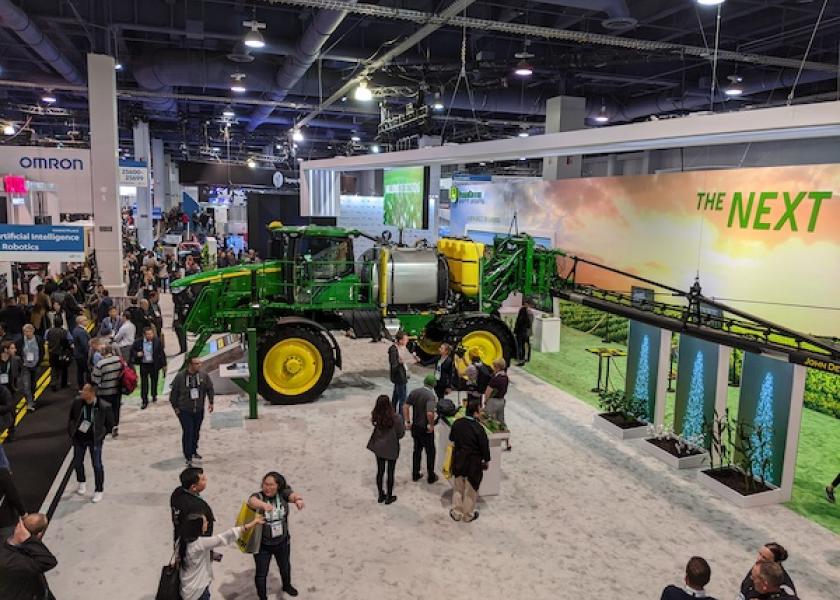Digital Duck Out of Water

Showing up at high-profile trade shows with big green equipment is nothing new for John Deere. But that’s to be expected right? Well not at this particular trade show. This time they were truly the proverbial fish out of water. But that was totally by design and here’s why.
This particular trade show was not just any ordinary trade show and almost no one on the planet has in the past has associated it with the world of agriculture. You see this is the over-the-top Consumer Electronics Show — CES for short — that is held the first of every year in Las Vegas. It is a big, big deal. Consider it the modern-day equivalent of the iconic World’s Fairs of yesteryear.
As with the World’s Fairs of the past the intent of CES is to give us ordinary people of glimpse of the future — a peek at just what our lives and livelihoods of tomorrow will look like because of new technology, inventions and ideas that are just now seeing the light of day. One of the great-est historical examples of this happened at the World’s Fair in Chicago in 1893. It was there where crowds from the cities, towns and even the farmsteads all across this continent and the globe gathered to see the entire fair lit up with a magical new technology called electricity. For many it was the first time seeing such an amazing innovation — an innovation that would truly transform the world over the next 40 years.
Deere’s presence at this year’s show was as much about sending a message to the masses as it was displaying the latest in agriculture technology. Ironically, the company exhibited at last year’s show but there seemed to be a lot more buzz this year about farm tech and agriculture in general.
Part of the reason for that may have been that in 2019 they had a combine on display and this year they had a Deere R4038 self-propelled sprayer equipped with tons of integrated tech from self-driving to the machine learning acquired through their recent acquisition of Blue River Technologies. Participants at the show had a chance to sit in the cab of one of the most advanced agricultural machines on the planet and see how this iron beast with machine learning technology is helping Deere develop a sprayer that could reduce herbicide use in particular cases by up to 90 percent by targeting sprays at individual weeds.
That right there was probably the most powerful message sent. Who cares how many bushels per hour a combine can harvest or much horsepower it can crank out? Who outside agriculture knows or even cares whether a combine is a Class 8, 9 or a 10? But when you highlight a technology that could dramatically reduce the total volume of herbicides needed to keep commercial agriculture viable and simultaneously win points for addressing sustainability with the rest of the population — well then that’s something everybody both inside and outside of agriculture totally gets.
Another possible reason for more “traction” at CES was that while Julian Sanchez, Deere’s director of precision agriculture was key in telling “agriculture’s story” at the show in the company’s booth during his personal “tireside chats”, he was also flanked at the overall event by other industry allies that helped tell that story. That story is with tech’s help agriculture can be part of the solution rather than the “problem” that some perceive it to be.
This was especially highlighted during the convention when Sanchez along with Sid Gorham, President of Digital Platforms for Corteva Agriscience was joined onstage by Renee Vassilos, Agriculture Innovation Director at the Nature Conservancy in a panel discussion entitled The Ag Ecosystem.
For one, this is a really interesting mix of people on stage regardless of whatever event it may be. The two “traditional” industry guys I get. But when the Nature Conservancy shares such an equal billing at such a spotlight event you know they’re not focused solely on talking about technology that helps farmers just farm fencerow-to-fencerow more efficiently. More than anything the panel took their time to reintroduce the crowd and anybody that was listening to 21st century agriculture and the modern-day farmer.
Bottom line, the panel really emphasized that if you’re building tech to solve a farmer’s problems you’d better get to know the people who produce your food on a more personal level. Who are they? What’s important to them? What do they want? It was made very clear that farmer’s don’t just want “another app” that’s just solving one-off problems or problems they didn’t even know they had. And the level of frustration is rising as it was spot on when it was said that farmers are “growing technologically impatient” when it comes to the current innovation state and continued half-baked promises of making their life easier and more rewarding.
So listen up all you techies from San Francisco to Shanghai — it’s time to develop technologies that does more than just cool things. Bells and whistles are so 1990’s. It’s time to make tech simpler and more integrated in the daily lives of farmers and their circle of trusted advisors. And if that’s not hard enough while agriculture is already an incredibly complex system the consumer is wanting and demanding it become even more diverse and less commoditized. The only way all of this gets solved is by understanding each other and solving problems together — tech alone is not the sole answer. It never was and never should be.







